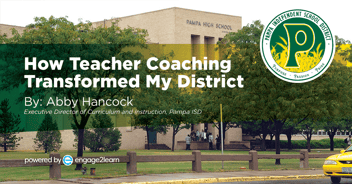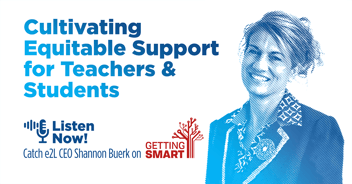The Secret to Effective Coaching
Lauren Hurt-Ashwin is the e2L Growth Catalyst and her primary responsibility is to provide leadership development to our team of e2L Certified eGROWE Coaches and our district partners. Our district coaches express how Lauren has made a direct impact on growing their work by helping them create systems for sustaining and scaling coaching. Coaches and teachers recognize Lauren’s ability to listen to their needs, ask reflecting questions, and find e2L resources for just-in-time professional learning and classroom tools. Read on to learn how Lauren shares how data is the secret weapon of coaches to inform coaching, track progress, and celebrate results.
What’s the secret?
It’s a combination of things. We believe that all people should have a coach and be coached consistently! We were never tempted to implement a full coaching cycle using the popular coaching models because we had all been practitioners and knew first-hand that this amount of time dedicated to coaching would never scale. So, we started researching how to keep the process efficient but ensure it was more effective at scale. The idea was that if we could make the conversation more evidence-based, it would create a way to keep the efficiency of coaching through conversation and add accountability to ensure we had a way of transferring the conversation to practice and making progress.
We adapted the performance-based GROW coaching model by adding the ‘Evidence’ at the start and finish of the conversation to increase clarity, accountability, and progress towards goals. Along with a Buerk rubric, the eGROWE Coaching Model results in quantifiable growth and we saw implementation accelerate immediately. When any process is built on systems thinking, then you actually can trust the process, follow it consistently and always get results. Utilizing the resulting coaching data to inform our goal setting as coaches and differentiation for coachees is key to effective, personalized support. Stay tuned for engage2Learn’s playbook on coaching coming this spring!
Why is it important for coaches to collect data?
Just like with students in the classroom, they are utilizing growth data is critical for ensuring the growth of all coachees. It confirms who is making progress to celebrate their work, and who might need more or differentiated coaching support. It allows leaders to see how they can support and grow coaches.
Coaching data is an opportunity not only to ensure that coaching is taking place throughout your school district but that people are growing, and the product of coaching is transferring to the classroom. It would be difficult to sustain or scale coaching without it.
How do coaches use data to inform the coaching process?
It is an opportunity for coaches to analyze the contributing factors to the data and determine how to best respond. For example, when looking at reports on growth, it is quickly evident if coachees are on track. Based on where the coachees are, consider the following questions about how their growth can be stimulated:
Just Getting Started
- What types of coaching have they had? What additional types make sense to try to help scaffold learning? (individual conversations, classroom visits, small group workshops, modeling for them, collaborating on a design together, etc.)
- What parts of the eGROWE coaching process could be improved upon to increase growth in coachees?
Making Progress
- Have administrators been collaborated with to share trends and discuss how they can participate in responding to the coaching data?
- Have small steps or quick wins been recognized or celebrated?
Crossing the Threshold
- How has their progress been celebrated? (added as Brightspot, endorsed on eSUITE, shared with administrators, used social media platforms)
- How has campus administrators celebrated their growth as part of the campus recognition system?
Transformed
- How has their progress been celebrated, and how has their expertise been used? (in addition to level 3 ideas- organized learning walks for others to see them in action, empowered them to lead a workshop for colleagues, etc..)
- How has campus administrators celebrated their growth as part of the campus recognition system? How has the district celebrated them as bright spots?
How do leaders or growth catalysts use data to ensure success and sustainability?
eSUITE, e2L’s coaching platform, includes coaching data reports that answer all of these questions:
Who, when, and what type of coaching is happening throughout the district? eSUITE shows whether or not those sessions occur as planned or whether they have been changed or canceled.
How much progress are coachees making? eSUITE outlines who is growing and at what pace.
What is the quality of the coaching conversations? Are coaches/ coachees having casual conversations, or are they focused on personal growth within their coaching role? eSUITE captures data that helps us know this.
Who should be celebrated? eSUITE awards badges based on growth and will provide the data on who to celebrate. Being recognized for accomplishments shows employees that attention is being paid to what they’re doing at work and value their contributions. People like to be recognized. Celebrations provide that opportunity.
Who is missing coaching, and why? There are many reasons someone might miss a scheduled coaching session such as illness, family emergencies, or could there be another reason such as being unprepared or are they unhappy on the job? Through e2L’s platform, this can be monitored.
Is the district showing an ROI for the coaching taking place? Through the extensive data reporting in eSUITE, it is clearly visible who is progressing. Evidence shows that when there is a vested interest in employees, employees are more loyal and motivated to continue to improve their skills.
What should the focus be for upcoming professional learning, and how could it be differentiated based on data? When there is a close eye on who is growing in each area and where there should be growth but not seeing it, professional learning can be planned so that it is relevant to the needs of teachers and coaches. Professional learning can even be personalized for each individual because data will show what they need.
When coaches use data to determine their decisions and plans, what are the key benefits?
When data is used to inform coaching, energy can be strategically focused instead of trying to do the same thing for everyone. Coachees are going to be successful a lot sooner when coaching data drives differentiated support, just like with students in the classroom.
What does it take to collect reliable and accurate data?
One great thing about e2L’s system is that it follows the eGROWE coaching process, and through the collaborative use of the platform come all the collective data points. Coachees self assess, and coaches confirm that assessment when growth is seen.
To ensure the accuracy of the data, it’s important for instructional coaches at the campus and district level to be calibrated on what growth looks like.

e2L Growth Catalyst
Lauren joined e2L in March 2013 after specializing in student-centered learning at the middle school level. She has coached elementary and secondary teachers on the e2L Best Practices and campus, and district level coaches in the e2L Coach Standards. Lauren now specifically works with district-level coaches to support the sustainability and scalability of coaching and is the Growth Catalyst for e2L, supporting and facilitating the growth of all e2L Coaches.



